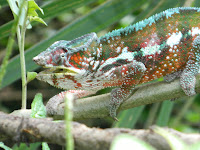
Hi everyone,
So I know,technically speaking I've been back for over a week. But it was good to get around to everything that needed to be taken care of before jumping on here and giving a half-ass response and follow up to my trip. If you've been paying attention, or wond
ered where I disappeared to for four weeks, you'd know I've been in Madagascar studying forest and lemur conservation.
I did keep a journal for the entirety of my trip, writing down what happened each day, writing letters to people who I know would never see them. My general musings and thoughts about what had happened that day. Now, the easy thing to do here would be to type out each and

everyday - what happened, where it happened, word for word. But as I looked over my journal I realized that doing that would eliminate the 20/20 hindsight perspective. So much ofwhat I experienced over there didn't ripen until I came back to this h
ustle-and-bustle world we live in here in the states.
It's easy to fall into the stereotypical, "I've been to a third-world country" category. Talking about all the poverty I saw, all of the environmental degradation, how things are so unjust and that it's the fault of the rich nations that Madagascar is how it is. Some of that is true. I saw more than a few children who were severely malnourished, I saw hillsides stripped bare or burning (we even ran up to put out a wildfire in area I was staying, luckily the local people didn't need our help, I doubt we would have been of much assistance) and yes, I did see the effects of rich nations shipping their toxic manufacturing overseas. "Out of sight, out of mind" only applies when your not the poor country having to deal with the mess.

But that's the story: if you're poor, it's easier for ot
hers who have their own interests in mind to keep you poor. Certainly, the big issue here lies in a flawed and corrupt political system that doesn't give its citizens a voice. But I digress...
Again, it's easy to become one of "those people"; those who have gone abroad, the defunct peace corps volunteer, the missionaries. It can get very depressing when you think about it. I mean, less than 10% of the rainforest remains and some of the officials I spoke to said it would all be gone in 25 years. Madagascar is very green, but most of the landscape is degraded, barren, and void of native species.
There's hope though. If there's one thing I learned throughout the entire trip, it's the importance of education. Educating people that, yes,this forest is important that, yes,

your country has so many endemic (e.g. that live nowhere else in the world) species that you can feel proud to still have them that, yes, you can find another way around the repression that the system feeds you. It's uplifting, but it takes time. It'll happen, because people are already starving. It's not a matter of the "white-man's burden", they don't need our help, it's a matter of national pride and a "Madagascar for Madagascar"attitude. They can feed themselves, they just need the opportunity and the resources to do it. That isn't up to America-the-Savior, to think so would be insulting. I saw more than a few people who w
ere extremely bright - paving the way for the Malagasy people.

I'm extremely excited to see what happens.
Yes, there was a ton of wildlife. I won't recap all of it, because that's one too many latin names for everything I saw. Lemurs, geckos, snakes, mushrooms, palms, birds, etc... I'm not a field guide! Instead, here are some of my favorite pictures of the animals, plants, and fungi I encountered.


Pardon the formatting. But anyways, that's about the gist of it. Sorry, no intense stories about trekking through the jungle. If you want those you'll have to meet me in person, text just doesn't have the right hand gesticulations. I'll be creating a flickr account with more of the "best of". For now, enjoy these.
Be Well.
 What did happen, however, is that a small group of people about 17 of us, showed up, talked a bit, and then went a sat down in a circle for 51 minutes. No rainbows, no lotus petals, no doves, just a nice clear day and a breeze. And that was, in and of itself, perfection. Thank you to everyone who came, sat, and witnessed to the tragedy of war and violence. It's not the end of peace-making, but the beginning of a long and hard road to live peacefully.
What did happen, however, is that a small group of people about 17 of us, showed up, talked a bit, and then went a sat down in a circle for 51 minutes. No rainbows, no lotus petals, no doves, just a nice clear day and a breeze. And that was, in and of itself, perfection. Thank you to everyone who came, sat, and witnessed to the tragedy of war and violence. It's not the end of peace-making, but the beginning of a long and hard road to live peacefully. 











 Hi everyone,
Hi everyone,